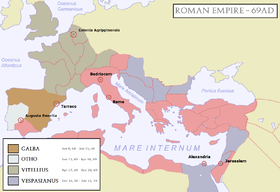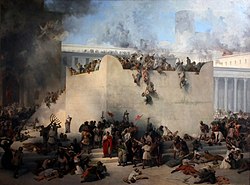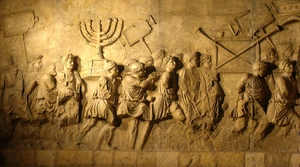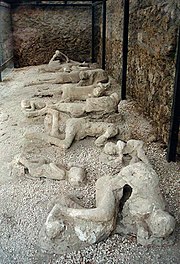Check out these fascinating articles for more great ideas:
List of All Roman Emperors and Empresses Chronologically organized:
Ancient Greek Cities or Kingdoms of Interest
Ancient Greek Rulers of Interest
Related to Christianity
Ancient Greek / Roman Deities, Locations and more:
Astrological Ancient Coins - Just some of the Ideas for Owning, available inside my eBay store.
Byzantine Coins Browse by Category:
Welcome to the best ancient Greek, Roman, Biblical, Medieval, Byzantine
online coin store. Up above are pages you can click on that give you great
ideas about the types of coins available for sale. Items are usually shipped
daily so you can rest assured to make these as great unique gifts for both
men and women. As a numismatist, I believe ancient coins make one of the
best investments. Collectors of numismatic coins may fall in love with this
old money. Ancient coins come in both bronze and precious metals such as
silver and gold. What is great is that you can great value as these types of
coins are not popularized in places such as the antiques roadshow or pawn
stars. You can see for yourself by the feedback, that there is over 99%
positive experience for anyone that shops here and that you are dealing with
one of the best, most reputable coin dealers on the internet. Coin
collecting is easy and fun with the wealth of information presented. It is
an amazing feeling to hold historical currency from thousands of years ago.
These coins are worth money not just for their intrinsic, but also
historical, numismatic and collector value. Investing money into an ancient
coin collection is for anyone who values rarity, beauty and so much more
that make up this great hobby. You may be looking for advice on how or where
to start. There are many great links available in my eBay store that cover
many great topics on ancient coins. Anything that you buy here is of great
value, especially for the long term and the short term. The prices you can
buy coins here are negotiable via the 'make offer' feature that is available
on all items so you can get amazingly good deals buying coins and a
selection of rarities not found anywhere else. The collecting guide above is
a great list that can be used as a tool to collect almost every emperor or
empress as it is in chronological order and allows you to search my store
for those coins by clicking on them. Other great topics, such as Ancient
Greek and Roman Commemorative coins deals with the most interesting
commemorative coins you can buy. Happy shopping. I look forward to dealing
with you for a lifetime. Some of the oldest, most valuable ancient coins
that you may find here are that of Julius Caesar and Alexander the Great.
Exchange your modern money for ancient money by buying an amazing ancient
coin today. A great gift for yourself and others.
To help people find my store
12 caesars coins
|
Titus - Roman Emperor 79-81 A.D. Biography & Certified Authentic Ancient Silver Coins Availble for PurchaseBuy certified ancient coins with Titus - Roman Emperor
Prior to becoming emperor, Titus gained renown as a military commander, serving under his father in Judaea during the First Jewish-Roman War, which was fought between 67 and 70. The campaign came to a brief halt with the death of emperor Nero on June 9, 68, launching Vespasian's bid for the imperial power during the Year of the Four Emperors. When Vespasian was declared emperor on July 1, 69, Titus was left in charge of ending the Jewish rebellion, which he did in 70, successfully besieging and destroying the city and the Temple of Jerusalem. For this achievement Titus was awarded a triumph; the Arch of Titus commemorates his victory to this day. Under the rule of his father, Titus gained infamy in Rome serving as prefect of the Roman imperial bodyguard, known as the Praetorian Guard, and for carrying on a controversial relationship with the Jewish queen Berenice. Despite concerns over his character, however, Titus ruled to great acclaim following the death of Vespasian on June 23, 79, and was considered a good emperor by Suetonius and other contemporary historians. In this role he is best known for his public building program in Rome—completing the Flavian Amphitheatre, otherwise known as the Colosseum— and for his generosity in relieving the suffering caused by two disasters, the Mount Vesuvius eruption of 79 and the fire of Rome of 80. After barely two years in office, Titus died of a fever on September 13, 81. He was deified by the Roman Senate and succeeded by his younger brother Domitian. Early lifeTitus was born in Rome, probably on 30 December 39, as the eldest son of Titus Flavius Vespasianus—commonly known as Vespasian—and Domitilla the Elder. He had one younger sister, Domitilla the Younger (b. 45), and one younger brother, also named Titus Flavius Domitianus (b. 51), but commonly referred to as Domitian. Decades of civil war during the 1st century BC had contributed greatly to the demise of the old aristocracy of Rome, which was gradually replaced in prominence by a new provincial nobility during the early part of the 1st century. One such family was the gens Flavia, which rose from relative obscurity to prominence in just four generations, acquiring wealth and status under the emperors of the Julio-Claudian dynasty. Titus's great-grandfather, Titus Flavius Petro, had served as a centurion under Pompey during Caesar's civil war. His military career ended in disgrace when he fled the battlefield at the Battle of Pharsalus in 48 BC. Nevertheless, Petro managed to improve his status by marrying the extremely wealthy Tertulla, whose fortune guaranteed the upwards mobility of Petro's son Titus Flavius Sabinus I, Titus's grandfather. Sabinus himself amassed further wealth and possible equestrian status through his services as tax collector in Asia and banker in Helvetia. By marrying Vespasia Polla he allied himself to the more prestigious patrician gens Vespasia, ensuring the elevation of his sons Titus Flavius Sabinus II and Vespasian to the senatorial rank. The political career of Vespasian included the offices of quaestor, aedile and praetor, and culminated with a consulship in 51, the year Domitian was born. As a military commander, he gained early renown by participating in the Roman invasion of Britain in 43. What little is known of Titus's early life has been handed down to us by Suetonius, who records that he was brought up at the imperial court in the company of Britannicus, the son of emperor Claudius, who would be murdered by Nero in 55. The story was even told that Titus was reclining next to Britannicus, the night he was murdered, and sipped of the poison that was handed to him. Further details on his education are scarce, but it seems he showed early promise in the military arts and was a skilled poet and orator both in Greek and Latin. Military careerFrom c. 57 to 59 he was a military tribune in Germania. He also served in Britannia, perhaps arriving c. 60 with reinforcements needed after the revolt of Boudica. In c. 63 he returned to Rome and married Arrecina Tertulla, daughter of a former Prefect of the Praetorian Guard. She died c. 65. Titus then took a new wife of a much more distinguished family, Marcia Furnilla. However, Marcia's family was closely linked to the opposition to Nero. Her uncle Barea Soranus and his daughter Servilia were among those who perished after the failed Pisonian conspiracy of 65. Some modern historians theorize that Titus divorced his wife because of her family's connection to the conspiracy. He never re-married. Titus appears to have had multiple daughters, at least one of them by Marcia Furnilla. The only one known to have survived to adulthood was Julia Flavia, perhaps Titus's child by Arrecina, whose mother was also named Julia. During this period Titus also practiced law and attained the rank of quaestor. Judaean campaignsFurther information: First Jewish-Roman War The province of Judaea during the 1st century. In 66 the Jews of the Judaea Province revolted against the Roman Empire. Cestius Gallus, the legate of Syria, was defeated at the battle of Beth-Horon and forced to retreat from Jerusalem. The pro-Roman king Agrippa II and his sister Berenice fled the city to Galilee where they later gave themselves up to the Romans. Nero appointed Vespasian to put down the rebellion, who was dispatched to the region at once with the fifth and tenth legions.[16] He was later joined by Titus at Ptolemais, bringing with him the fifteenth legion. With a strength of 60,000 professional soldiers, the Romans prepared to sweep across Galilee and march on Jerusalem. The history of the war was covered in dramatic detail by the Roman-Jewish historian Josephus in his work The Wars of the Jews. Josephus served as a commander in the city of Jotapata when the Roman army invaded Galilee in 67. After an exhausting siege which lasted 47 days, the city fell, with an estimated 40,000 killed and the remaining Jewish resistance committing suicide. Josephus himself surrendered to Vespasian, became a prisoner and provided the Romans with intelligence on the ongoing revolt. By 68, the entire coast and the north of Judaea were subjugated by the Roman army, with decisive victories won at Taricheae and Gamala, where Titus distinguished himself as a skilled general. Year of the Four EmperorsMap of the Roman Empire during the Year of the Four Emperors (69 AD). Blue areas indicate provinces loyal to Vespasian and Gaius Licinius Mucianus. The last and most significant fortress of Jewish resistance was Jerusalem. However the campaign came to a sudden halt when news arrived of Nero's death. Almost simultaneously, the Roman Senate had declared Galba, then governor of Hispania, as Emperor of Rome. Vespasian decided to await further orders, and sent Titus to greet the new princeps. Before reaching Italy, Titus learnt that Galba had been murdered and replaced by Otho, governor of Lusitania, and that Vitellius and his armies in Germania were preparing to march on the capital, intent on overthrowing Otho. Not wanting to risk being taken hostage by one side or the other, he abandoned the journey to Rome and rejoined his father in Judaea. Meanwhile, Otho was defeated in the First Battle of Bedriacum and committed suicide. When the news spread across the armies in Judaea and Ægyptus, they took matters into their own hands and declared Vespasian emperor on July 1, 69. Vespasian accepted, and through negotiations by Titus joined forces with Gaius Licinius Mucianus, governor of Syria. A strong force drawn from the Judaean and Syrian legions marched on Rome under the command of Mucianus, while Vespasian himself travelled to Alexandria, leaving Titus in charge to end the Jewish rebellion. By the end of 69 the forces of Vitellius had been beaten, and Vespasian was officially declared emperor by the Senate on December 21, thus ending the Year of the Four Emperors. Siege of JerusalemDestruction of the Temple of Jerusalem, Francesco Hayez, oil on canvas, 1867. Depicting the destruction and looting of the Second Temple by the Roman army. Meanwhile the Jews had become embroiled in a civil conflict of their own, splitting the resistance in the city among two factions; the Sicarii led by Simon Bar Giora, and the Zealots led by John of Gischala.[30] Titus seized the opportunity to begin the assault on Jerusalem. The Roman army was joined by the twelfth legion, which was previously defeated under Cestius Gallus, and from Alexandria Vespasian sent Tiberius Julius Alexander, governor of Ægyptus, to act as Titus's second in command. Titus surrounded the city, with three legions (Vth, XIIth and XVth) on the western side and one (Xth) on the Mount of Olives to the east. He put pressure on the food and water supplies of the inhabitants by allowing pilgrims to enter the city to celebrate Passover, and then refusing them egress. Jewish raids continuously harassed the Roman army, one of which nearly resulted in Titus being captured. After attempts by Josephus to negotiate a surrender had failed, the Romans resumed hostilities and quickly breached the first and second walls of the city. To intimidate the resistance, Titus ordered deserters from the Jewish side to be crucified around the city wall. By this time the Jews had been thoroughly exhausted by famine, and when the weak third wall was breached bitter street fighting ensued. The Romans finally captured the Antonia Fortress and began a frontal assault on the gates of the Temple. According to Josephus, Titus had ordered that the Temple itself should not be destroyed, but while the fighting around the gates continued a soldier hurled a torch inside one of the windows, which quickly set the entire building ablaze. The later Christian chronicler Sulpicius Severus, possibly drawing on a lost portion of Tacitus' Histories, claims that Titus favoured destruction of the Temple. Whatever the case, the Temple was completely demolished, after which Titus's soldiers proclaimed him imperator in honor of the victory. Jerusalem was sacked and much of the population killed or dispersed. Josephus claims that 1,100,000 people were killed during the siege, of which a majority were Jewish. 97,000 were captured and enslaved, including Simon Bar Giora and John of Gischala. Many fled to areas around the Mediterranean. Titus reportedly refused to accept a wreath of victory, as he claimed there is "no merit in vanquishing people forsaken by their own God". Heir to VespasianTitus' triumph after the First Jewish-Roman War was celebrated with the Arch of Titus in Rome, which shows the treasures taken from the Temple in Jerusalem, including the Menorah and the Trumpets of jericho Unable to sail to Italy during the winter, Titus celebrated elaborate games at Caesarea Maritima and Berytus, then travelled to Zeugma on the Euphrates, where he was presented with a crown by Vologases I of Parthia. While visiting Antioch he confirmed the traditional rights of the Jews in that city. On his way to Alexandria, he stopped in Memphis to consecrate the sacred bull Apis. According to Suetonius, this caused consternation; the ceremony required Titus to wear a diadem, which the Romans associated with kingship, and the partisanship of Titus's legions had already led to fears that he might rebel against his father. Titus returned quickly to Rome – hoping, says Suetonius, to allay any suspicions about his conduct. Upon his arrival in the city in 71, Titus was awarded a triumph. Accompanied by Vespasian and Domitian he rode into the city, enthusiastically saluted by the Roman populace and preceded by a lavish parade containing treasures and captives from the war. Josephus describes a procession with large amounts of gold and silver carried along the route, followed by elaborate re-enactments of the war, Jewish prisoners, and finally the treasures taken from the Temple of Jerusalem, including the Menorah and the Pentateuch. Simon Bar Giora was executed in the Forum, after which the procession closed with religious sacrifices at the Temple of Jupiter. The triumphal Arch of Titus, which stands at one entrance to the Forum, memorializes the victory of Titus. The Arch of Titus, located on the Via Sacra, just to the south-east of the Forum Romanum in Rome. With Vespasian declared emperor, Titus and his brother Domitian likewise received the title of Caesar from the Senate. In addition to sharing tribunician power with his father, Titus held seven consulships during Vespasian's reign and acted as his secretary, appearing in the Senate on his behalf. More crucially, he was appointed commander of the Praetorian Guard, ensuring their loyalty to the emperor and further solidifying Vespasian's position as a legitimate ruler. In this capacity he achieved considerable notoriety in Rome for his violent actions, frequently ordering the execution of suspected traitors on the spot. When in 79, a plot by Aulus Caecina Alienus and Eprius Marcellus to overthrow Vespasian was uncovered, Titus invited Alienus to dinner and ordered him to be stabbed before he had even left the room. During the Jewish wars, Titus had begun a love affair with Berenice, sister of Agrippa II. The Herodians had collaborated with the Romans during the rebellion, and Berenice herself had supported Vespasian upon his campaign to become emperor. In 75, she returned to Titus and openly lived with him in the palace as his promised wife. The Romans were wary of the Eastern Queen and disapproved of their relationship. When the pair was publicly denounced by Cynics in the theatre, Titus caved in to the pressure and sent her away, but his reputation further suffered. EmperorSuccessionVespasian died of an infection on June 23 79 AD, and was immediately succeeded by his son Titus. Because of his many alleged vices, many Romans feared at this point that he would be another Nero. Against these expectations, however, Titus proved to be an effective emperor and was well-loved by the population, who praised him highly when they found that he possessed the greatest virtues instead of vices. One of his first acts as an emperor was to publicly order a halt to trials based on treason charges, which had long plagued the principate. The law of treason, or maiestas law, was originally intended to prosecute those who had corruptly 'impaired the people and majesty of Rome' by any revolutionary action. Under Augustus, however, this custom had been revived and applied to cover slander or libellous writings as well, eventually leading to a long cycle of trials and executions under such emperors as Tiberius, Caligula and Nero, spawning entire networks of informers that terrorized Rome's political system for decades. Titus put an end to this practice, against himself or anyone else, declaring:
Consequently, no senators were put to death during his reign; he thus kept to his promise that he would assume the office of Pontifex Maximus "for the purpose of keeping his hands unstained". The informants were publicly punished and banished from the city, and Titus further prevented abuses by introducing legislation that made it unlawful for persons to be tried under different laws for the same offense. Finally, when Berenice returned to Rome, he sent her away. As emperor he became known for his generosity, and Suetonius states that upon realising he had brought no benefit to anyone during a whole day he remarked, "Friends, I have lost a day." ChallengesThe 79 eruption of Mount Vesuvius completely destroyed Pompeii and Herculaneum. Today plaster casts of actual victims found during excavations are on display in some of the ruins. Although his administration was marked by a relative absence of major military or political conflicts, Titus faced a number of major disasters during his brief reign. On August 24, 79, barely two months after his accession, Mount Vesuvius erupted, resulting in the almost complete destruction of life and property in the cities and resort communities around the Bay of Naples. The cities of Pompeii and Herculaneum were buried under metres of stone and lava, killing thousands of citizens. Titus appointed two ex-consuls to organise and coordinate the relief effort, while personally donating large amounts of money from the imperial treasury to aid the victims of the volcano. Additionally, he visited Pompeii once after the eruption and again the following year. During the second visit, in spring of AD 80, a fire broke out in Rome, burning large parts of the city for three days and three nights. Although the extent of the damage was not as disastrous as during the Great Fire of 64—crucially sparing the many districts of insulae—Cassius Dio records a long list of important public buildings that were destroyed, including Agrippa's Pantheon, the Temple of Jupiter, the Diribitorium, parts of Pompey's Theatre and the Saepta Julia among others. Once again, Titus personally compensated for the damaged regions. According to Suetonius, a plague similarly struck during the fire. The nature of the disease, however, or the death toll are unknown. Meanwhile war had resumed in Britannia, where Gnaeus Julius Agricola pushed further into Caledonia and managed to establish several forts there. As a result of his actions, Titus received the title of Imperator for the fifteenth time. His reign also saw the rebellion led by Terentius Maximus, one of several false Neros who continued to appear throughout the 70s. Although Nero was primarily known as a universally hated tyrant—there is evidence that for much of his reign, he remained highly popular in the eastern provinces. Reports that Nero had in fact survived the assassination attempts were fueled by the vague circumstances surrounding his death and several prophecies foretelling his return. According to Cassius Dio, Terentius Maximus resembled Nero in voice and appearance and, like him, sang to the lyre. Terentius established a following in Asia minor but was soon forced to flee beyond the Euphrates, taking refuge with the Parthians. In addition, sources state that Titus discovered that his brother Domitian was plotting against him but refused to have him killed or banished. Public worksThe Flavian Amphitheatre, better known as the Colosseum, was completed during the reign of Titus and inaugurated with spectacular games that lasted for 100 days. See Inaugural games of the Flavian Amphitheatre. Construction of the Flavian Amphitheatre, presently better known as the Colosseum, was begun in 70 under Vespasian and finally completed in 80 under Titus. In addition to providing spectacular entertainments to the Roman populace, the building was also conceived as a gigantic triumphal monument to commemorate the military achievements of the Flavians during the Jewish wars. The inaugural games lasted for a hundred days and were said to be extremely elaborate, including gladiatorial combat, fights between wild animals (elephants and cranes), mock naval battles for which the theatre was flooded, horse races and chariot races. During the games, wooden balls were dropped into the audience, inscribed with various prizes (clothing, gold, or even slaves), which could then be traded for the designated item. Adjacent to the amphitheatre, within the precinct of Nero's Golden House, Titus had also ordered the construction of a new public bath-house, which was to bear his name. Construction of this building was hastily finished to coincide with the completion of the Flavian Amphitheatre. Practice of the imperial cult was revived by Titus, though apparently it met with some difficulty as Vespasian was not deified until six months after his death. To further honor and glorify the Flavian dynasty, foundations were laid for what would later become the Temple of Vespasian and Titus, which was finished by Domitian. DeathAt the closing of the games, Titus officially dedicated the amphitheatre and the baths, which was to be his final recorded act as an emperor. He set out for the Sabine territories but fell ill at the first posting station where he died of a fever, reportedly in the same farm-house as his father. Allegedly, the last words he uttered before passing away were: "I have made but one mistake". Titus had ruled the Roman Empire for just over two years, from the death of his father in 79 to his own on September 13 81. He was succeeded by Domitian, whose first act as emperor was to deify his brother. Historians have speculated on the exact nature of his death, and to which mistake Titus alluded in his final words. Philostratus writes that he was poisoned by Domitian with a sea hare, and that his death had been foretold to him by Apollonius of Tyana. Suetonius and Cassius Dio maintain he died of natural causes, but both accuse Domitian of having left the ailing Titus for dead. Consequently, Dio believes Titus's mistake refers to his failure to have his brother executed when he was found to be openly plotting against him. According to the Babylonian Talmud (Gittin 56b), an insect flew into Titus's nose and picked at his brain for seven years. He noticed that the sound of a blacksmith hammering caused the ensuing pain to abate, so he paid for blacksmiths to hammer nearby him; however, the effect wore off and the insect resumed its gnawing. When he died, they opened his skull and found the insect had grown to the size of a bird. The Talmud gives this as the cause of his death and interprets it as divine retribution for his wicked actions. LegacyHistoriographyTitus's record among ancient historians stands as one of the most exemplary of any emperor. All the surviving accounts from this period, many of them written by his own contemporaries, present a highly favourable view towards Titus. His character has especially prospered in comparison with that of his brother Domitian. The Wars of the Jews offers a first-hand, eye-witness account on the Jewish rebellion and the character of Titus. The neutrality of Josephus' writings has come into question however as he was heavily indebted to the Flavians. In 71, he arrived in Rome in the entourage of Titus, became a Roman citizen and took on the Roman nomen Flavius and praenomen Titus from his patrons. He received an annual pension and lived in the palace. It was while in Rome, and under Flavian patronage, that Josephus wrote all of his known works. The War of the Jews is heavily slanted against the leaders of the revolt, portraying the rebellion as weak and unorganized, and even blaming the Jews for causing the war. The credibility of Josephus as a historian has subsequently come under fire. Another contemporary of Titus was Publius Cornelius Tacitus, who started his public career in 80 or 81 and credits the Flavian dynasty with his elevation. The Histories—his account of this period—was published during the reign of Trajan. Unfortunately only the first five books from this work have survived until the present day, with the text on Titus's and Domitian's reign entirely lost. Suetonius Tranquilius gives a short but highly favourable account on Titus's reign in The Lives of Twelve Caesars, emphasizing his military achievements and his generosity as Emperor, in short describing him as follows:
Finally, Cassius Dio wrote his Roman History over a hundred years after the death of Titus. He shares a similar outlook as Suetonius, possibly even using the latter as a source, but is more reserved, noting:
Pliny the Elder, who later died during the eruption of Mount Vesuvius, dedicated his Naturalis Historia to Titus. In contrast to the ideal portrayal of Titus in Roman histories, in Jewish memory "Titus the Wicked" is remembered as an evil oppressor and destroyer of the Temple. For example, one legend in the Babylonian Talmud describes Titus as having had sex with a whore on a Torah scroll inside the Temple during its destruction. Titus in later artsThe Triumph of Titus, by Sir Lawrence Alma-Tadema (1885). The composition suggests a love affair between Titus and Domitian's wife Domitia Longina (see below). The war in Judaea and the life of Titus, particularly his relationship with Berenice, have inspired writers and artists through the centuries. The bas-relief in the Arch of Titus has been influential in the depiction of the destruction of Jerusalem, with the Menorah frequently being used to symbolise the looting of the Second Temple. Literature
Paintings
|
|
www.TrustedCoins.comm Buy Real Ancient Greek Roman Biblical Byzantine Coins and Artifacts |
|
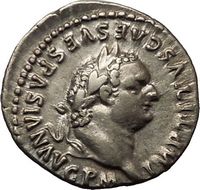
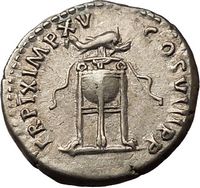
 Titus
Flavius Vespasianus, commonly known as Titus (December 30, 39
– September 13, 81), was a
Titus
Flavius Vespasianus, commonly known as Titus (December 30, 39
– September 13, 81), was a

